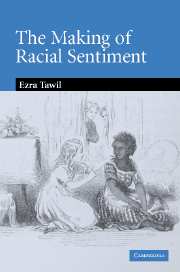Book contents
- Frontmatter
- Contents
- Acknowledgments
- Introduction: Toward a literary history of racial sentiment
- 1 The politics of slavery and the discourse of race, 1787–1840
- 2 Remaking natural rights: race and slavery in James Fenimore Cooper's early writings
- 3 Domestic frontier romance, or, how the sentimental heroine became white
- 4 “Homely legends”: the uses of sentiment in Cooper's The Wept of Wish-Ton-Wish
- 5 Stowe's vanishing Americans: “negro” interiority, captivity, and homecoming in Uncle Tom's Cabin
- Conclusion: Captain Babo's cabin: racial sentiment and the politics of misreading in Benito Cereno
- Notes
- Index
2 - Remaking natural rights: race and slavery in James Fenimore Cooper's early writings
Published online by Cambridge University Press: 22 September 2009
- Frontmatter
- Contents
- Acknowledgments
- Introduction: Toward a literary history of racial sentiment
- 1 The politics of slavery and the discourse of race, 1787–1840
- 2 Remaking natural rights: race and slavery in James Fenimore Cooper's early writings
- 3 Domestic frontier romance, or, how the sentimental heroine became white
- 4 “Homely legends”: the uses of sentiment in Cooper's The Wept of Wish-Ton-Wish
- 5 Stowe's vanishing Americans: “negro” interiority, captivity, and homecoming in Uncle Tom's Cabin
- Conclusion: Captain Babo's cabin: racial sentiment and the politics of misreading in Benito Cereno
- Notes
- Index
Summary
“LETTERS TO HIS COUNTRYMEN”: SLAVERY IN COOPER'S POLITICAL WRITINGS
This chapter revisits an old question in Cooper criticism: what did his just-so stories of racial conflict in the colonial past have to say about the most pressing political issues of his own time? By reading Cooper's first Leatherstocking novel, The Pioneers (1823), alongside some of his properly political writing from the 1820s and 1830s, I demonstrate how a fictional narrative about the past could offer a narrative solution to the contemporary crisis of slavery during a period when political discourse, including his own political writing, was curiously unable to do so. Viewed against the historical backdrop I laid out at the beginning of the previous chapter, in which the debate over slavery became periodically focused on the propriety of discussing it in national political forums, frontier fiction was aided in this endeavor by its thematic distance from slavery as such. At the same time, however, Cooper is able in The Pioneers to take up complex questions of entitlement and ownership within the confines of narrative fiction. In a manner that recalls the movements between the “Indian” and the “black” in Jefferson's Notes on the State of Virginia, the frontier novel was thus endowed, at the moment of its birth as a genre, with the ability to think the relationship between these two figures of dispossession and the relevance of physical and characterological differences in accounting for both.
- Type
- Chapter
- Information
- The Making of Racial SentimentSlavery and the Birth of The Frontier Romance, pp. 69 - 91Publisher: Cambridge University PressPrint publication year: 2006

